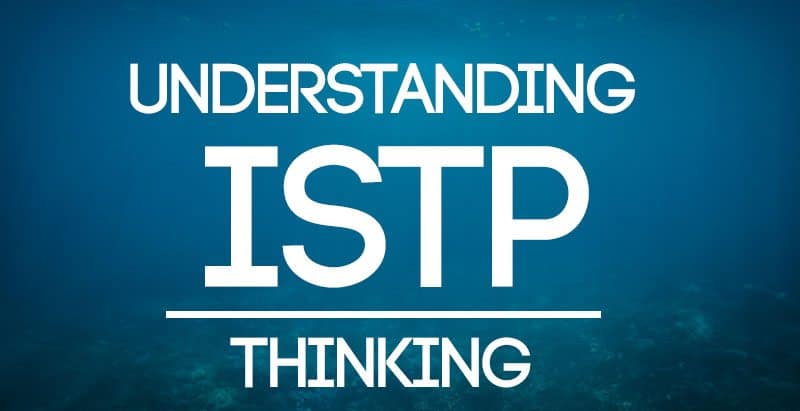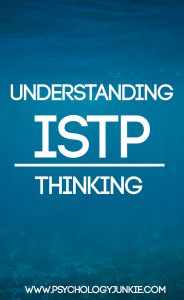Understanding ISTP Thinking
“A man cannot understand the art he is studying if he only looks for the end result without taking the time to delve deeply into the reasoning of the study.”
– Miyamoto Musashi, an ISTP
ISTPs are some of the most intriguing and perceptive individuals you’ll ever meet. When you’re in their presence you can’t help but feel that they notice everything, sense everything, yet tell very little. They have incredible analytical abilities and are extremely aware of everything that’s happening. If a crisis erupts or there’s a problem that needs to be solved quickly, they’re able to keep a steady head and find a solution without panicking. It’s no wonder that many great warriors, leaders, and engineers have been ISTPs.

ISTPs can excel in nearly any field, but they are known for their strong survival skills, understanding of technology and hands-on processes. They are not only realistic and pragmatic, but they are also independent thinkers who don’t conform to other people’s rules and ways of thinking. The ISTP seeks to find his or her own way, their own “rules” for life, and their own method for completing a project. They have a strong focus on efficiency, yet unlike Te users, they rarely direct others or share their strategies out loud.
Not sure what your personality type is? Take our new personality questionnaire here. Or you can take the official MBTI® here.
“I’m not in this world to live up to your expectations and you’re not in this world to live up to mine.”
– Bruce Lee, an ISTP
If you know an ISTP, what you’ll see most readily is their auxiliary function, Extraverted Sensing (Se). This function gives them their keen awareness of their environment and the ability to act quickly to make the most of the moment. However, the ISTP’s dominant function is Introverted Thinking (Ti). Ti is internalized and less obvious to the outer world, but it is the most advanced of the ISTP’s functions.
Understanding Introverted Thinking
Introverted Thinking (Ti) is focused on deeply understanding one’s own knowledge of a subject and finding out how it relates to other subjects. Ti-users are skilled at stripping a problem down to its principles and solving complex issues. They have what typologists call “subjective logic”. This means that they are less apt to rely on someone else’s code or set of rules, and more likely to construct their own set of rules and principles. While they can easily collect facts and figures, they are more concerned with understanding the basis and underlying mechanics behind how something works.
ISTPs can instantaneously spot logical loopholes and they are excellent at debating a point, although they care very little whether other people agree or disagree with them in the end. They just need to know that they are living up to their own standards. This is why Ti-users tend to care less about grades and an impressive report card than Te-users, who appreciate confirmation of their logic. Carl Jung said of the Introverted Thinker, that he “will hardly ever go out of his way to win anyone’s appreciation of his ideas…He merely exposes them, and is often extremely annoyed when they fail to thrive on their own account.”
ISTPs are quick to discern what doesn’t make sense or isn’t true – but they have less confidence explaining what “is” true. This is because they don’t like to make up their minds on something until they’ve explored every possible angle and ensured that everything checks out. They hold themselves to incredibly high standards about what they believe in, accept, study, or teach.
Typologist A.J. Drenth says in his book My True Type: Clarifying Your Personality Type, Preferences & Functions that Ti-users “despise working in a cookie-cutter, step-by-step fashion. Eschewing instruction manuals and “how-to” guides whenever possible, they prefer to use their own methods and powers of reasoning to figure things out.”
ISTPs and INTPs are both Ti-dominant types, however, ISTPs will be more skilled at realistic, hands-on applications, whereas INTPs are much more theoretical in their approach. ISTPs excel in fields where they can physically interact with their environment and provide practical solutions. They often excel in engineering, agriculture, law enforcement, and skilled trades. There are also a large percentage of ISTPs in the military.
Characteristics of ISTPs:
– They are extremely independent
– They are impersonal yet observant
– They are concerned with understanding underlying principles
– They keep an organized set of facts in their minds.
– They tend to be outwardly reserved, detached, and aloof
– They are very aware of their surroundings
– They tend to have very good hand-eye coordination
– They live primarily “in the moment”
– They are excellent problem-solvers
– They think quickly in a crisis
The Neuroscience of ISTP Thinking
According to Dario Nardi, a UCLA Professor and expert in the field of neuroscience, ISTPs “show high use of four brain regions that afford complex logical reasoning….Ti types dedicate themselves to using brain resources that other people tend to neglect.” These four regions are in charge of many different tasks: linearly deriving solutions, categorizing and defining concepts, integrating visual-kinesthetic data, and weighing numerous pros and cons of many factors or options. Nardi suggests that Ti-users can think even when there are visual, auditory, and kinesthetic distractions. As a result, Ti-users can detach themselves from what’s happening in the current moment to think through a problem clearly. This makes them good at multi-tasking, and also contributes to their somewhat detached persona.
Nardi also states that ISTPs are the most advanced of all the types at integrating visual-kinesthetic data. They use a region in their brain that aids in “object identification, motor skills such as aim, and mathematical calculating using a grid. It also helps us to determine where we end and the rest of the world begins.”
If you’re interested in more information on the neuroscience of the ISTP mind, check out Dario Nardi’s book, Neuroscience of Personality: Brain Savvy Insights for All Types of People
Why ISTPs Are the People You Need in a Crisis
ISTPs combine Introverted Thinking (Ti) and Extraverted Sensing (Se) to respond effectively in a crisis. Their auxiliary Se keeps them “checked in” to their environment and able to respond quickly and appropriately, while Ti allows them to mentally find a solution without becoming overwhelmed or panicky. It is often only after the crisis has been averted that ISTPs feel symptoms of stress, like shoulder aches and pains, headaches, or an upset stomach. Most ISTPs, however, enjoy the occasional physical crisis or the stimulation from solving a problem. You can read about this more in “Why ISTPs Make the Best Action Heroes”
Fun Facts About ISTPs
These facts are taken from the MBTI® Manual – Third Edition.
– ISTPs are highly represented among male college scholarship athletes.
– In a national sample “Leisure Activities”, ISTPs were overrepresented in “Playing with computers or video games”.
– They prefer the academic subjects of math and practical skills.
– The most important features of an ideal job were “A stable and secure future”.
– ISTPs greatly crave autonomy in their work and home life.
What Do You Think?
Was this post helpful? Do you have any thoughts to add? Let me know in the comments!
Find out more about your personality type in our eBooks, Discovering You: Unlocking the Power of Personality Type or The INFJ – Understanding the Mystic. You can also connect with me via Facebook, Instagram, or Twitter!
Sources:
The MBTI® Manual – Third Edition
Psychological Types by C.J. Jung
Gifts Differing – Understanding Personality Type by Isabel Briggs Myers
The Neuroscience of Personality by Dario Nardi
Subscribe to Our Newsletter

Want to discover more about personality type? Get the inside scoop with Susan Storm on all things typological, along with special subscriber freebies, and discounts on new eBooks and courses! Join our newsletter today!















15 Comments